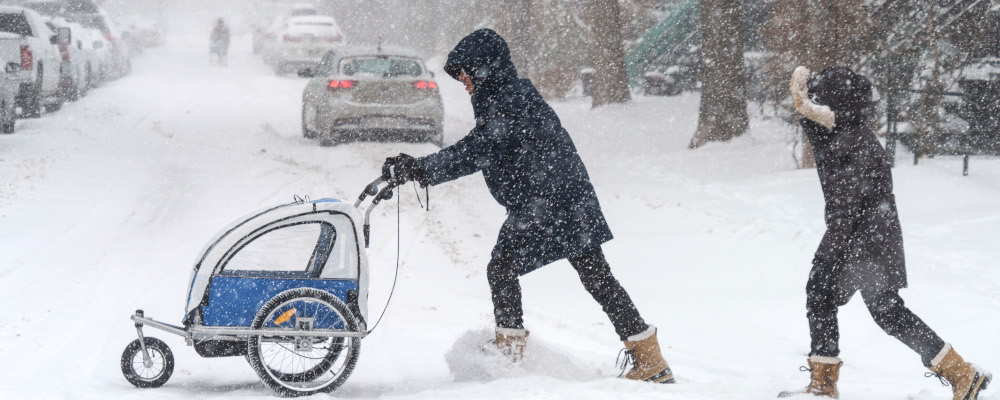Lyman Stone, a demographer and Cardus senior fellow, delivered the following remarks ahead of a panel discussion called Culture, Canadian Demographics, and Climate Change, sponsored by the Canadian Gas Association and The Hub. In this lightly edited excerpt of his remarks, Stone breaks down his recent Cardus report, “Climate and the Crib,” examining to what extent concerns about climate change are affecting family formation.
For [this] report, we turned to the question of climate change. And we didn’t go to climate change because we wanted something sensational or because we wanted to make an argument about climate change or its relevance as an issue. In fact, the report, if you’ve looked over it, doesn’t have a word to say about the science behind climate change or what’s causing it or how bad it will be. Our only question is, what effect do worries about climate change have on people’s family decisions?
Now, if you’ve paid attention to the media over the last several years, you probably have a prior belief that climate change is quite important for people’s family decisions. We can look at groups like Birthstrike that make quite a big fuss about not having babies until climate change is addressed.

You can look at all the rhetoric around the population bomb. I think there’s a new story almost every month, it seems, about climate worries among young people or [the] reason they’re not having kids. So we said, “Okay, is this true? How would we test this?” A straightforward way to test it is to give women [a survey.] So, if you give women 30 or 40 options on the kinds of concerns they could have [which keep them from having children], how many of them select climate change from that list? Of course, we also let women write in options as well, and if they wrote in something else, we coded it appropriately and things like that.
We did the survey in English and French. We over-sampled non-Canadian-born individuals as well to make sure that we were appropriately representing Canada’s emerging and growing ethno-cultural diversity. Really what we find is that climate change is not a top-10 concern that women have in terms of their beliefs about what’s shaping their fertility.
The top 10 are mostly broad financial things, not specific financial things. Not like, “Oh, childcare was too expensive.” But something like, “I’m just generally low-income.” Or broad life course reasons like, “I’m not personally ready for children. I need to work on myself more. I don’t have a partner yet. I’m still in school.” Okay, so broad life sequencing issues and broad financial issues dominate the top 10.
We also ask, just for clarification, about climate change and also about overpopulation. “How much are you worried about climate change and how much are you worried about overpopulation?” The reason we did this is because we suspected from prior survey research that these were not the same thing. That there would be people who are worried about climate change but not overpopulation. And that there would be people who are worried about overpopulation but not climate change.
What we found, to give you the very short version, is that women who say that climate change is a worry that influenced their family planning, do have smaller desired family sizes: about 0.7 kids fewer on average. They desire smaller families. In an ideal world, if you just ask them, “How many kids ideally would you like to have,” they give a lower number on average. So maybe that says climate worries really matter, and they’re shaving fertility and they reduce fertility.
But then we also ask about intentions. “How many children do you intend to have?” This is no longer just asking about desires. This is asking about let’s get down to brass tacks. Really, your intentions for your life. What’s going to happen there? Again, women who are worried about climate change intended somewhat lower numbers, about 0.4 fewer children. Still a difference, but a smaller difference.
Then we looked at older women, particularly women ages 35 and older, and we asked “How many children do you currently have?” And that allowed us to look at behaviour. What we found is that there was no statistically significant difference in actual childbearing between women who were worried about climate change and women who weren’t. So then we said, “Wow if there’s not this big difference in behaviour, what explains the difference in desires?”
If it’s not spilling out on the behavioural side quite so much, the answer turns out to be, and this won’t surprise anyone, climate worries turn out to be political. People associated with some political parties are a lot more likely to have climate change worries than others. This surprises no one. This is not a controversial statement. What’s interesting is when you look within political parties, if you look at people who voted for the Green Party, for example, there’s virtually no difference in their desired family size based on whether they say climate worries impacted their family planning.
And [it’s the] same within the NDP or within Liberals or Conservatives as within people of a broad political worldview: specific climate worries don’t matter. And this tells us something important. Climate worries are not likely to be a major driver of low fertility. On the other hand, broad worldview packages that sometimes include climate worries probably are. This was also a conclusion of our previous report on religiosity.

Now, what do I mean by broad worldview packages? And what would that be if it’s not a collection of specific ideas? And what I would say is this: there’s a lot of academic research on fertility contagion, and that is the idea that people emulate the behaviour of others around them. This is basic sociology. When you see other people doing something, if it goes all right, you tend to do it more. When you’re in a social group that encourages smaller or larger family sizes where people tend to have fewer or more children, where choices to have fewer or more children are lauded or condemned, or treated as praiseworthy and excellent or as unfortunate as different options, it tends to influence your behaviour.
Once your behaviour is influenced, the next psychological step is to find a justification for your behaviour. You don’t say I’m having fewer children because people in my social group have fewer children and I’m fitting in, which is, by the way—and this is not a pejorative—what we all do. It’s not like people on one side of the political spectrum are more susceptible to peer pressure. Everyone does this. Everyone is, in fact, influenced by the culture they’re in, the society there, and the people around them.
Rather, what happens is, that once we are in a social and structural environment that nudges us towards a certain set of life outcomes and a certain set of ideas, then we have the motivation to look for [clearer] propositional justifications. For some people, it’s climate change. For some people, it’s something else.
This is why what we find in this study and our previous one is that the best predictor of lower fertility, both ideals, intentions, and behaviours, is not any specific worry. It’s just the sum number of worries that women check the box on, which is essentially just a measure of exposure to anxiety, to worry, to concern about the world. Now that’s a topic for another day to explore in much greater depth. Empirically, though, I think we can have a really interesting conversation about it.
We don’t have all the answers on what’s driving that, but that is where this report ends up: climate change, qua climate change itself, does not dramatically influence fertility. But as part of this broader set of growing anxiety about the world, a growing sense of uncertainty, it’s part of that package that on the whole reduces fertility desires, fertility intentions, and ultimately actual childbearing.
Recommended for You

Falice Chin: The ‘wild and weird’ Calgary Stampede

‘A celebration of the spirit of Alberta’: Ryan Hastman on the political, economic, and cultural importance of the Calgary Stampede

Michael Geist: Children accessing porn is a problem, but government-approved age verification technologies are not the answer

Daniel Zekveld: Age verification for pornography is not government overreach



